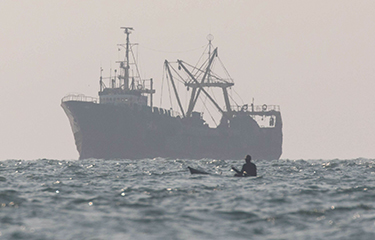Chinese vessels accused by EJF of IUU fishing, labor transgressions in Somali waters

A new investigation has exposed how China is defying international law to carry out illegal fishing operations in Somali water, while subjecting foreign crew to mistreatment.
A new Environmental Justice Foundation report claims six Chinese fishing vessels entered Somali waters without permission and used prohibited fishing gear, such as trawl nets, in fishing zones that have been reserved for Somali fishing communities.
“These practices cause irreversible damage to marine life and threaten the livelihoods and food security of Somali fishing communities,” EJF said.
The crew also said they were denied food, subjected to physical abuse, refused pay, and not permitted to leave the ship. At least 13 Indonesian crew were illegally detained by Chinese captains in the vessels, one of whom died as he tried to flee, EJF said. The remaining 12 were later rescued and repatriated in a joint effort by EJF, Destructive Fishing Watch, and International Justice Mission.
The vessels “also caught protected, often endangered, species, including whale sharks, dolphins, turtles, and even what is thought to be a megamouth shark – an extremely elusive shark species with less than 100 specimens ever observed," EJF said.
Crew who spoke to EJF narrated how they were coerced into catching dolphins that were subsequently cooked for the Chinese crew, in violation of Somali law and China’s Distant-Water Fishing Management Regulation, which prohibits capture of marine mammals.
The Indonesian crew reported being forced to “fin sharks,” incidents EJF described as “barbaric and wasteful,” since the shark bodies are thrown back into the sea alive after their fins are removed.
“We threw away all small-sized sharks but for the bigger-size sharks, like above 20 kilograms, we would take the fins only and throw away the bodies,” one crewmember told EJF.
China's distant-water fleet has been taking advantage of Somalia’s inability to effectively patrol and protect its waters, EJF Founder and CEO Steve Trent said.
Trent said illegal fishing and a lack of transparency in the fishing sector is fueling incidents of human rights violations and cautioned that as “fish populations plummet and catches become smaller, unscrupulous operators turn to trafficking and slavery to make a profit.”
“It is also time for major market states such as the European Union, the U.S.A., and Japan to come together to force China to face up to its responsibilities to address the widespread environmental and human rights abuses in its distant-water fishing fleet,” Trent said.
Photo courtesy of the Environmental Justice Foundation






Share